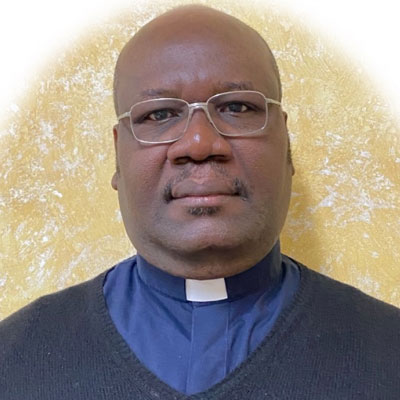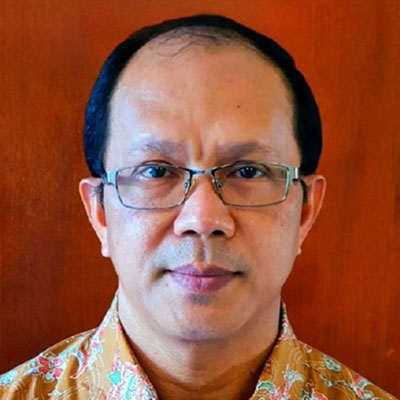 By Jean-Gracia Étienne, cicm
By Jean-Gracia Étienne, cicmGeneral Councilor
Listening in interpersonal relationships
Listening is something fundamental in all interpersonal relationships and also in the human-divine relationship. Indeed, in the Bible, God speaks to His people and never ceases to ask them to listen. He reveals to them that through listening, they will know happiness (cf. Deut. 4:1). Thus, the first of the commandments is the Shema Israel that every Jewish parent teaches to his children from generation to generation (cf. Deut. 6:4). Therefore, we can say that listening is the key to good mutual understanding and that listening and entering into oneself brings life.[1] There are, however, many ways to listen to others. But it seems to us that listening with empathy is more appropriate in the context of the current crisis with its disastrous consequences on individuals’ lives.
Listening as a fraternal service
Listening is a precious gift that we can offer to others, especially in this time of crisis. We do not need much literature to show us that we live in incredibly difficult times with a future that has become more and more uncertain. The majority of the world’s population is finding it increasingly difficult to meet its basic needs. Even affluent people also face different types of difficulties, though they do not have to strive to obtain basic necessities. We are in direct or indirect contact with most of these categories of people who need to be listened to attentively; hence the urgency of making listening a fraternal service as well.
Adverse effects of non-listening
There is no doubt that there are people who have suffered painfully from non-listening in humanity's history. This situation is mentioned several times in the Bible. Take, for example, the character of Job, who in his torment cried out: “O that I had one to hear me”! (Jb. 31:35). Job also cried out: “Listen carefully to my speech and let this be your way of consolation. Bear with me that I may speak; then after I have spoken, you may mock me” (Jb. 21:2-3). Unfortunately, we can see that listening is becoming very superficial and rare amidst the current world’s turmoil. Several factors can explain this situation. First, our world is overwhelmed by the superfluity of speech on TV, radio, social networks, etc. Second, due to the virtual nature of communication with other people on the other side of the world, people devote less and less time to those close to them. Finally, people have become ever “dependent” on their electronic devices and are preoccupied with other concerns.
In light of this, it is more important than ever to train ourselves to listen so as to counteract the many causes of non-listening and make understanding more effective in relationships. There is much to be said about listening as a vital capacity in all human and human-divine relationships. Since, in this sharing, we want to focus on listening with empathy, we must seek to understand empathy better as an innate and natural capacity rooted in the depths of our human identity. [2]
What we mean by empathy
The concept of empathy has been defined in different ways. However, a consensus is emerging around certain fundamental elements related to this term, facilitating the emergence of specific definitions. We will limit ourselves here to two. The First of all, “empathy today refers to the ability to put oneself in the place of the other person in order to understand what he or she is experiencing”.[3] Moreover, according to the French dictionary Micro-Robert, empathy is “the ability to identify with others, to feel what they feel”. From these two brief related definitions, we can say that empathy implies an opening to the other while seeking to grasp what the others feel, see, or live in a given situation.
To better play this role, we need to forget about ourselves and care for each other in order to create constructive communication and meaningful relationships. Often our listening skills are relatively weak. We do not pay enough attention to the verbal and non-verbal messages that the other person conveys to us. Sometimes non-verbal messages, such as facial expressions, voice tones, body gestures, can be more expressive than words. [4]
Evolution in the understanding of empathy
The term empathy, as we understand it today, is not new. It is a philosophical concept that has been the subject of sustained reflection for more than a century. It has been the object of research and reflection by thinkers, from experts in psychology and neurology to sages, saints, and healers.[5] The concept “empathy” has become an inescapable concept today when we talk about interpersonal relationships. Indeed, it should be noted that “on the modern path of listening training, we encounter the rich and promising notion of empathy. Thanks to Carl ROGERS, listening has become central to human relationships. We can only listen to others by being able to focus on them”.[6] Nowadays, one of the approaches to helping people that emphasize active listening as the practical basis of a helping relationship is counseling, in its various forms and procedures. However, each individual is also called upon to practice listening daily.
Talk to me, I'm listening [7]
This cordial invitation is the title of a work in Italian. It could well express the availability of the person who is about to listen. At the same time, it is an invitation to the other to open up to dialogue. In a dialogue, it is essential to know how to distinguish between listening and hearing but also clarify the relationship between these two notions. Moreover, it is necessary to know the requirements that must be met to ensure good listening conditions. Therefore, it is essential not to confuse empathy with other human feelings, which are also very important in interpersonal relationships, such as sympathy, understanding, and the phenomenon of emotional contagion.
From this perspective, it is not possible to sympathize with someone you do not love, but it is possible to empathize with them. Thus, empathy is cultivated; it is, above all, a way of being. As religious missionaries, we must also develop a religious practice of empathy, called empathy in faith.
What is empathy in faith?
Empathy in faith is a believer’s way of practicing empathy. It is a way of living faith, hope, and love through concrete gestures, especially towards people who may need help to overcome difficulties in their lives. We must allow ourselves to be guided on this path by the Holy Spirit, who is the power and strength of God and who also reveals himself as an impetus for action.
We must not limit ourselves to illuminating the mind with our wisdom and exciting others' hearts with feelings of love, hope, and joy. The Spirit also moves us to transform enlightenment and love into action and effective work.[8] Empathy in faith can also be seen as an effective way to help us overcome the limitations and pitfalls of empathy, such as simulation, projection, assimilation, etc., by setting love its driving force.
Let’s cultivate more empathy
We hope that these few lines will be an encouragement for us to seek a better understanding of empathy as an innate attitude that allows us to understand better and feel, even if only partially, the emotions and suffering of others. Moreover, we hope that these lines can help us practice empathy more consciously in our daily interpersonal relationships, in our pastoral approaches, and in the many different forms of the accompaniment wherein, people must always be at the center of any helping relationship. A good practice is learned and cultivated through training while keeping a certain balance.
It should also be remembered that in the practice of listening with empathy, “the golden mean is to resonate with the other, not to merge, which leads to confusion”.[9] Also, we must not forget this principle known and accepted by all: “Man is a mystery, an authentic mystery”. This means that a person is more than the body he possesses, his occupations, the social position he occupies, what he owns, etc. All these qualities are only some of the aspects through which he expresses himself.
To complete these few elements, we can also say that, in a Christian context, the person is a body, mind, spirit, image, and child of God. Thus, the person is revealed as a unique being, conscious, responsible, free, and capable of loving. We must also keep in mind that each person has his or her history and particularity. By taking these aspects into account, we can better relate and walk with a person under the Spirit's guidance. The prudence of the Spirit will allow us to respond to the concerns of our fellows. This capability for empathy can lead us to genuine encounters. Guided by the Holy Spirit, let us dare to take one more step each day towards this culture of encounter.
Listening in interpersonal relationships
Listening is something fundamental in all interpersonal relationships and also in the human-divine relationship. Indeed, in the Bible, God speaks to His people and never ceases to ask them to listen. He reveals to them that through listening, they will know happiness (cf. Deut. 4:1). Thus, the first of the commandments is the Shema Israel that every Jewish parent teaches to his children from generation to generation (cf. Deut. 6:4). Therefore, we can say that listening is the key to good mutual understanding and that listening and entering into oneself brings life.[1] There are, however, many ways to listen to others. But it seems to us that listening with empathy is more appropriate in the context of the current crisis with its disastrous consequences on individuals’ lives.
Listening as a fraternal service
Listening is a precious gift that we can offer to others, especially in this time of crisis. We do not need much literature to show us that we live in incredibly difficult times with a future that has become more and more uncertain. The majority of the world’s population is finding it increasingly difficult to meet its basic needs. Even affluent people also face different types of difficulties, though they do not have to strive to obtain basic necessities. We are in direct or indirect contact with most of these categories of people who need to be listened to attentively; hence the urgency of making listening a fraternal service as well.
Adverse effects of non-listening
There is no doubt that there are people who have suffered painfully from non-listening in humanity's history. This situation is mentioned several times in the Bible. Take, for example, the character of Job, who in his torment cried out: “O that I had one to hear me”! (Jb. 31:35). Job also cried out: “Listen carefully to my speech and let this be your way of consolation. Bear with me that I may speak; then after I have spoken, you may mock me” (Jb. 21:2-3). Unfortunately, we can see that listening is becoming very superficial and rare amidst the current world’s turmoil. Several factors can explain this situation. First, our world is overwhelmed by the superfluity of speech on TV, radio, social networks, etc. Second, due to the virtual nature of communication with other people on the other side of the world, people devote less and less time to those close to them. Finally, people have become ever “dependent” on their electronic devices and are preoccupied with other concerns.
In light of this, it is more important than ever to train ourselves to listen so as to counteract the many causes of non-listening and make understanding more effective in relationships. There is much to be said about listening as a vital capacity in all human and human-divine relationships. Since, in this sharing, we want to focus on listening with empathy, we must seek to understand empathy better as an innate and natural capacity rooted in the depths of our human identity. [2]
What we mean by empathy
The concept of empathy has been defined in different ways. However, a consensus is emerging around certain fundamental elements related to this term, facilitating the emergence of specific definitions. We will limit ourselves here to two. The First of all, “empathy today refers to the ability to put oneself in the place of the other person in order to understand what he or she is experiencing”.[3] Moreover, according to the French dictionary Micro-Robert, empathy is “the ability to identify with others, to feel what they feel”. From these two brief related definitions, we can say that empathy implies an opening to the other while seeking to grasp what the others feel, see, or live in a given situation.
To better play this role, we need to forget about ourselves and care for each other in order to create constructive communication and meaningful relationships. Often our listening skills are relatively weak. We do not pay enough attention to the verbal and non-verbal messages that the other person conveys to us. Sometimes non-verbal messages, such as facial expressions, voice tones, body gestures, can be more expressive than words. [4]
Evolution in the understanding of empathy
The term empathy, as we understand it today, is not new. It is a philosophical concept that has been the subject of sustained reflection for more than a century. It has been the object of research and reflection by thinkers, from experts in psychology and neurology to sages, saints, and healers.[5] The concept “empathy” has become an inescapable concept today when we talk about interpersonal relationships. Indeed, it should be noted that “on the modern path of listening training, we encounter the rich and promising notion of empathy. Thanks to Carl ROGERS, listening has become central to human relationships. We can only listen to others by being able to focus on them”.[6] Nowadays, one of the approaches to helping people that emphasize active listening as the practical basis of a helping relationship is counseling, in its various forms and procedures. However, each individual is also called upon to practice listening daily.
Talk to me, I'm listening [7]
This cordial invitation is the title of a work in Italian. It could well express the availability of the person who is about to listen. At the same time, it is an invitation to the other to open up to dialogue. In a dialogue, it is essential to know how to distinguish between listening and hearing but also clarify the relationship between these two notions. Moreover, it is necessary to know the requirements that must be met to ensure good listening conditions. Therefore, it is essential not to confuse empathy with other human feelings, which are also very important in interpersonal relationships, such as sympathy, understanding, and the phenomenon of emotional contagion.
From this perspective, it is not possible to sympathize with someone you do not love, but it is possible to empathize with them. Thus, empathy is cultivated; it is, above all, a way of being. As religious missionaries, we must also develop a religious practice of empathy, called empathy in faith.
What is empathy in faith?
Empathy in faith is a believer’s way of practicing empathy. It is a way of living faith, hope, and love through concrete gestures, especially towards people who may need help to overcome difficulties in their lives. We must allow ourselves to be guided on this path by the Holy Spirit, who is the power and strength of God and who also reveals himself as an impetus for action.
We must not limit ourselves to illuminating the mind with our wisdom and exciting others' hearts with feelings of love, hope, and joy. The Spirit also moves us to transform enlightenment and love into action and effective work.[8] Empathy in faith can also be seen as an effective way to help us overcome the limitations and pitfalls of empathy, such as simulation, projection, assimilation, etc., by setting love its driving force.
Let’s cultivate more empathy
We hope that these few lines will be an encouragement for us to seek a better understanding of empathy as an innate attitude that allows us to understand better and feel, even if only partially, the emotions and suffering of others. Moreover, we hope that these lines can help us practice empathy more consciously in our daily interpersonal relationships, in our pastoral approaches, and in the many different forms of the accompaniment wherein, people must always be at the center of any helping relationship. A good practice is learned and cultivated through training while keeping a certain balance.
It should also be remembered that in the practice of listening with empathy, “the golden mean is to resonate with the other, not to merge, which leads to confusion”.[9] Also, we must not forget this principle known and accepted by all: “Man is a mystery, an authentic mystery”. This means that a person is more than the body he possesses, his occupations, the social position he occupies, what he owns, etc. All these qualities are only some of the aspects through which he expresses himself.
To complete these few elements, we can also say that, in a Christian context, the person is a body, mind, spirit, image, and child of God. Thus, the person is revealed as a unique being, conscious, responsible, free, and capable of loving. We must also keep in mind that each person has his or her history and particularity. By taking these aspects into account, we can better relate and walk with a person under the Spirit's guidance. The prudence of the Spirit will allow us to respond to the concerns of our fellows. This capability for empathy can lead us to genuine encounters. Guided by the Holy Spirit, let us dare to take one more step each day towards this culture of encounter.








